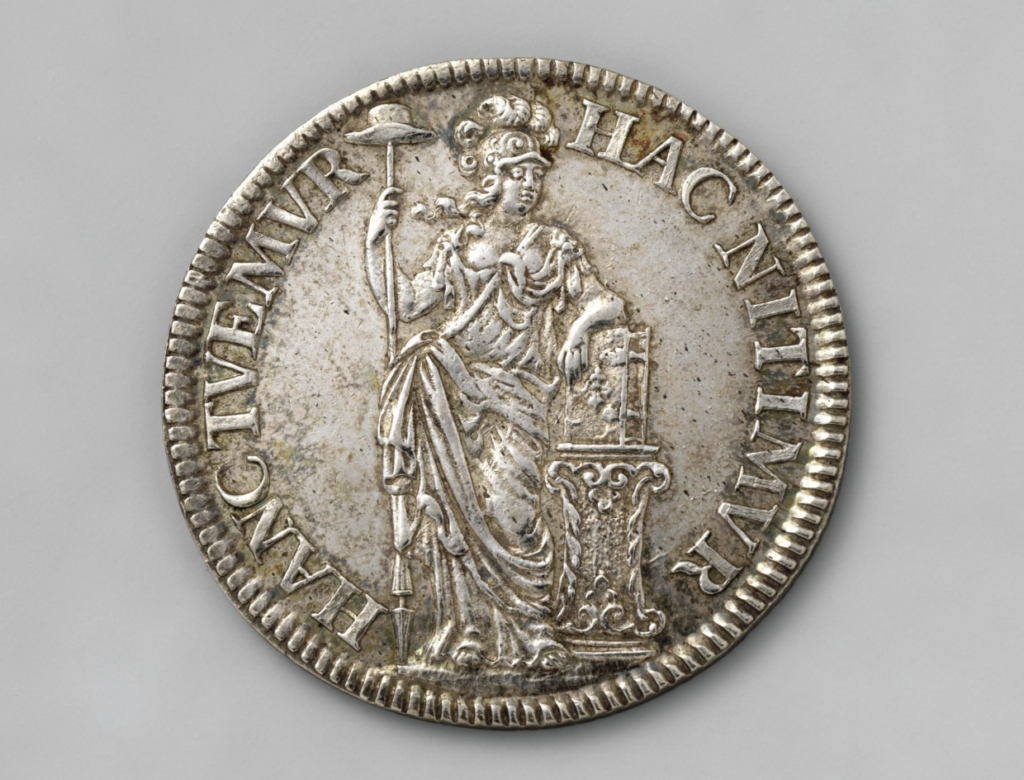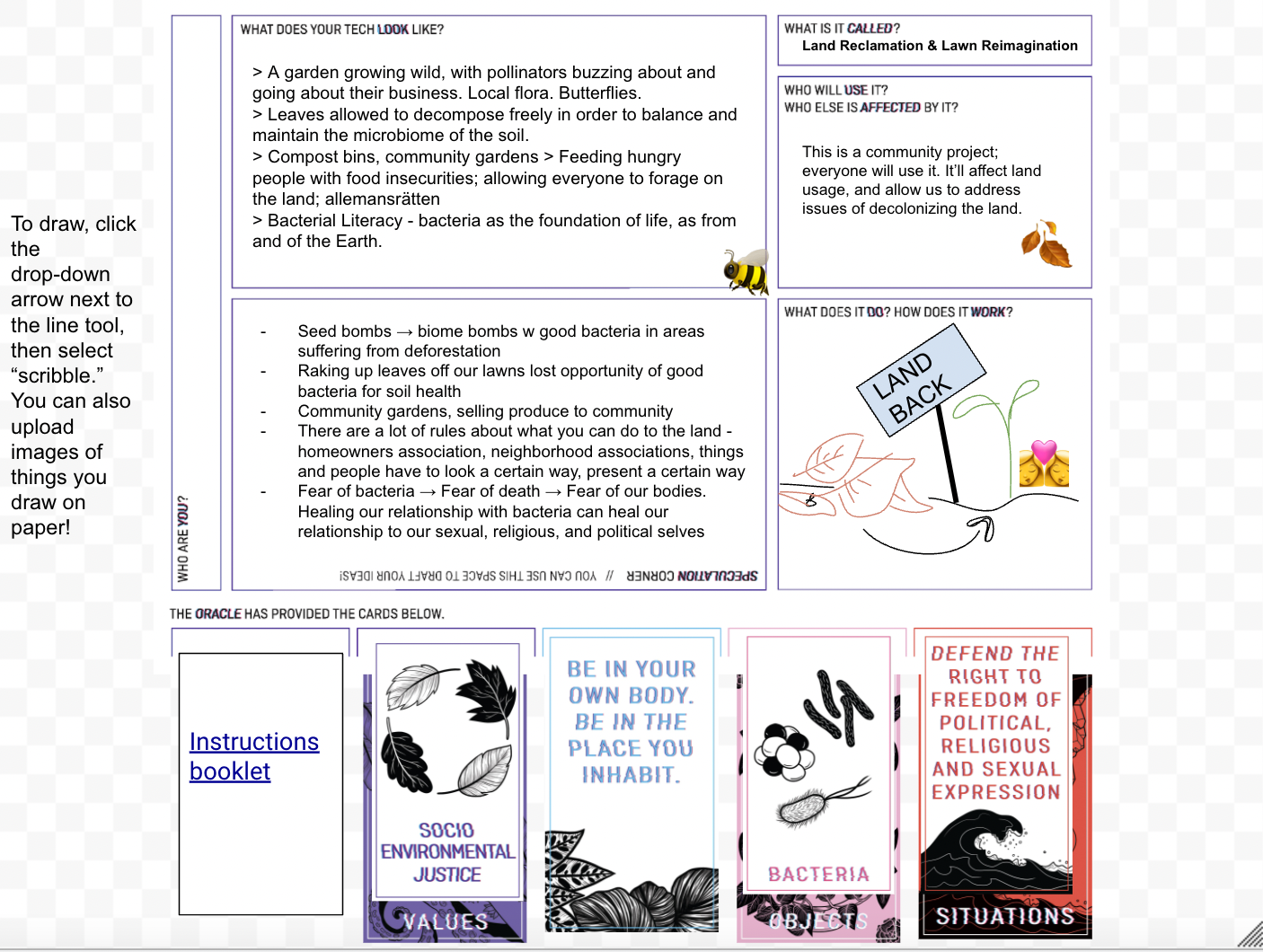The Oracle for Transfeminist Technologies workshop session began with an acknowledgment that Manhattan was originally Lenape land, as well as a brief reflection on how to decolonize both online and physical spaces. It was also mentioned that much of Manhattan was constructed by enslaved Africans, performing forced labor on land that originally belonged to the indigenous population.
Manhattan was indeed ceded territory, purchased in May of 1626 for the sum of “60 guilders.” Below you will find an example of a well-preserved guilder from 1682, courtesy of the Rijksmuseum in Amsterdam. Estimates of the value of this sum in modern currency vary, but there is a consensus that it was worth no more than $15,000 in today’s USD.

We then read a poem together – “There is an Edge: Ode to Radical Imagination, by Adrienne Maree Brown.” We had a discussion during which we discussed how the edge of our imagination is an internal, imaginary boundary that we impose on ourselves instead of a physical, tangible border.
We then used the Oracle for Transfeminist Technologies, the homepage of which you can find linked here.
The workshop leader, Alicia Peaker, explained that this oracle was based on the idea of tarot, and announced that she had already prepared several ‘readings,’ based upon the deck. The deck itself consists primarily of Value Cards, Object Cards, and various Situation Cards.
Some examples of Values include but are not limited to: Resilience, Queerness, Agency, Consent, Diversity, and Decoloniality, in no particular order.
Object Cards include but are not limited to: Wine, Trash Bins, Spoons, Lipstick, Bread, and Bacteria, in no particular order.
Situation Cards are more complex. My favorites? “Use Technology as a Tool for Feminist Resistance,” and “Amplify the Narratives of Women and Queer Persons.”
There is only one Bodies card, and it reads: “You carry the stories of the body and the territories you inhabit.” This card is intended to go along with each and every reading, as a visual reminder to be gentle to ourselves and each other, as well as to take steps to decolonize our spaces and our thinking. It encourages us to think about our bodies, our burdens, and our respective privileges. This card enables us to meditate on the relationship between ourselves, our bodies, and the bodies of land we inhabit. It helps us draw a distinct border between our minds and our bodies, in order to blur and indeed cross that line, or at the very least, become aware of it.
I was placed in a breakout room with two of my colleagues in DH from another college outside the CUNY system. Our reading seemed to stump us at first; our object with which to build was Bacteria, our value was socio-environmental justice, and our situation was “to defend the right to freedom of political, religious, and sexual expression.”
Our Body card was there, a pertinent reminder of the Earth we all share, and our thoughts turned to the literal earth – the soil beneath our feet, teeming with good bacteria and decomposers tirelessly performing the work of renewal and recycling, without any expectation of thanks or praise.
And yet they are vital. They are from the earth, of the earth, and to the earth, they shall return. Rich soil is full of nutrients and natural fertilizers only because of the presence of bacteria. This was fundamental as much as it was foundational.
One avenue of conversation we ambled down was fraught by our situation – how do we ensure freedom of political, and especially religious, expressions, when the idea of the tree of life, evolutionary theory, Darwinism, etc. was so diametrically opposed to the Judeo-Christian worldview, cosmogony, and Creation stories?
We decided the world needed more of what we called “bacterial literacy” – knowledge of how important our microbiome is, teachings about ecology and the role of bacteria in the cycle of life, and environmental microbiology, sometimes known as microbial ecology. We needed to change the narrative that soil is “dirty” and that dirt, and by extension, the bacteria it harbors, is by nature distasteful and repugnant. We needed to re-envision a world where leaves aren’t meticulously raked each autumn, and are instead allowed to rot into the good and giving ground, in order to provide vital nutrients for next season’s vegetation. We needed to reclaim the land that has been lost to lawns, and spread awareness of water waste and bee colony collapse.
In this vein, we called our project “Land Reclamation and Lawn Reimagination.”
You can see more of our thoughts below. We grappled with things like food insecurity, indigenous land wisdom, the Swedish concept of allemansrätten, our shared wariness of our local Homeowner’s Associations, and in the end, the concept of our collective mortality itself.

When we gathered back towards the end of the workshop, I was energized and pleased with what we had thought about, created, ideated about, and accomplished. I think we all walked out of the room with a new perspective on bacteria, but my most important takeaway was and remains this: That together, we can solve problems and build new technologies, find solutions and forge a path towards a brighter, more inclusive future. Alone, we are doomed to travel the beaten path. Together, we can make and take the road not yet built; we can strive to co-create a better future for us all. Together, we are unstoppable.




